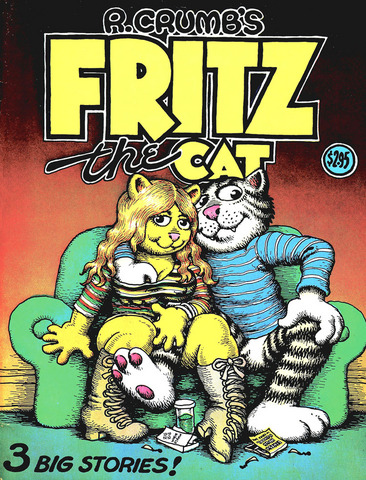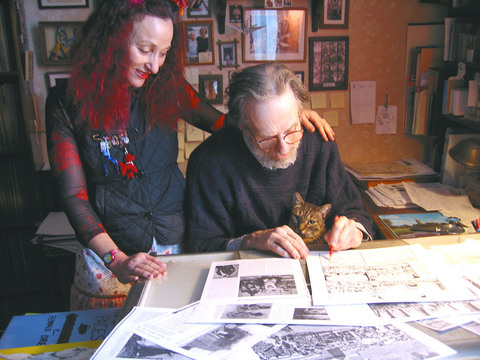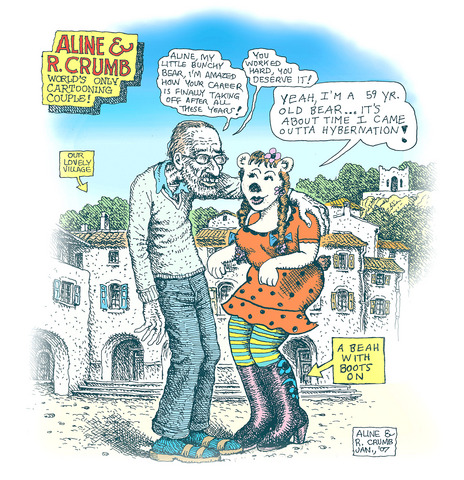Shortly after Robert and Aline Crumb moved from the US to a small village in this valley in the South of France, they were asked to participate in a summer medieval festival.
For the event, local politicians don robes like those once worn by feudal lords, and most of the citizens wear peasant rags.
Crumb, timid, like the famous cartoon caricature of himself he draws in his comic strips, is not one for parades. The father of Fritz the Cat, Mr. Natural and Devil Girl declined to participate.

PHOTO: NY TIMES NEWS SERVICE
Aline Crumb, bold, like the red-haired cartoon version of herself she draws, agreed to join the procession and asked for the cotton rags. The festival organizers would not hear of it. "They told me, 'No, you have to get a costume of a lady in waiting because your husband is an important person,"' Aline Crumb, 59, recalled over breakfast at their 13-room house, parts of which date from the 11th century.
Although the brocaded costume was stiflingly hot — "I felt like a giant sweating chair," Aline Crumb said — it turns out the townsfolk were prescient. In a twist as unlikely as the plot of an R. Crumb comic, the couple, known to many from the 1994 documentary Crumb, which portrayed Robert Crumb's troubled early family life and adult predilection for riding piggyback on large women, have become something of a lord and lady in their village. They are surrounded by a bohemian court of artists, lovers, sycophants and jesters engaged in fits of intrigue.
"We live in Crumbland," Aline Crumb said.

PHOTOS: NY TIMES NEWS SERVICE
They moved to France 16 years ago, sickened, they said, by the infiltration of their once sleepy California town, Winters, by newcomers who bulldozed hilltops for McMansions. The Crumbs also wanted to shield their daughter, Sophie, from a growing conservative and fundamentalist Christian influence while continuing to educate her in what they consider the classics. They reared her on Little Lulu comics from the 1940s and 1950s and Three Stooges videos.
It was Robert Crumb's absorption of such popular culture that led to his signature style. He applied a lowbrow, all but forgotten crosshatched technique to a kaleidoscope of sexual fantasies, controversial racial topics and images of the hippy counterculture. In so doing, he laid the groundwork for adult-theme graphic novels, influencing everyone from Daniel Clowes, the creator of Ghost World, to Art Spiegelman, the author of Maus.
"He's a monolithic presence, who rewrote the rules of what comics are," Spiegelman said.

Much of Crumbland's energy is devoted to preserving space for Crumb, 63, to continue his work and for everyone to feed off it.
When the Crumbs moved to their village west of Nimes — which they asked not be named, fearful of attracting streams of fans — many old houses were empty. Villagers preferred modern homes with square rooms across the river, where streets are wide enough for two cars to pass.
But since the Crumbs' arrival, many of the achingly quaint, empty stone houses have attracted other newcomers. One of the first was Aline Crumb's brother, Alex Goldsmith, who lives in the lower ramparts of the Crumb home. Goldsmith, 54, said he had fought drug addiction, and if his sister had not welcomed him to France, "I'd probably be in prison, if I was alive."
He earns money buying used R. Crumb comics on eBay, taking them upstairs for Robert Crumb to sign and reselling them "for quadruple" on the Internet, Goldsmith said, smiling.
For years, Crumb would occupy his time waiting to be served at village restaurants by doodling on place mats. When his New York agent, Paul Morris, said that he had a market for the drawings, Aline Crumb offered to help one restaurateur sell his collection. They fetched US$25,000. A pizzeria sold its R. Crumb doodles to Morris for US$2,500 each.
Another village newcomer is Christian Coudures, a printmaker, who moved from Paris. When he was depressed after breaking up with a girlfriend, Aline Crumb decided he was a project she wanted to take on.
"When I first met him, he was in bad shape, drinking a lot," she said. "I decided I needed to save this worthy person."
Coudures eventually became what Aline Crumb calls her "second husband."
The Crumbs have long had an open marriage, that brave (and largely discarded) institution of the 1960s. Crumb travels to Oregon once a year to rekindle a relationship with an old girlfriend.
Speaking of Coudures, Crumb said, "Between the two of us, we kind of make an ideal husband, because he can do all the masculine things I can't do." He cited Coudures' talents for wiring, plumbing, engaging in shouting matches with the highly energetic Aline Crumb and driving a car.
"If she ever started making comparisons about our lovemaking technique, I might get jealous," Crumb added.
Their daughter, Sophie, is not so sure about the arrangement. She called the idea of her mother's having a second husband "gross."
Nonetheless, the strong-jawed Coudures, 61, has become a part of the support system that frees Crumb to focus on work. The Frenchman, who has a thick mane of black hair, does handyman chores. His daughter Agathe McCamy, 35, helps Aline Crumb color her comics.
"I am a Situationist," Coudures explained in French after sharing a dinner with the Crumbs next to a gently crackling fireplace in his kitchen. He was referring to a European avant-garde philosophy born in 1957 and championed by Guy Debord. "I am an adventurer of the present."
Crumb's current project has him spending a lot of time in the past. He is illustrating the opening book of the Bible, Genesis, and spends hours in his study deep in the Crumb house consulting translations of Sumerian legends, Hebrew and Christian scholarly interpretations of the Bible and reproductions of illuminated manuscripts.
The work contains biblical scenes populated with classic R. Crumb women, their legs and ankles hearty, their breasts straining through flimsy dresses. But the work is not sexually graphic. Nor has the artist altered a word of the Genesis text.
Crumb has calmed considerably since his early days, when he was so afraid of social interaction that he focused all of his energy on drawing. "I basically lived on paper," he said, reclining on a small wicker couch in his study, where the shelves are packed with vintage 78 rpm records, comic book figurines and back issues of Fate, a magazine of the paranormal.
In recent years he has taken to sitting in a chair every morning and meditating for 45 minutes, following the rising and falling of his breath. The resulting inner calm has changed his vibe. As a younger man he was a gerbil-like creature with a whiskery mustache and a twitchy demeanor. Now he seems more like a small Lincoln or Van Gogh, a bearded, although still bony, thinker with a certain gravity.
"He's less wimpy," said Sophie Crumb, now 25, who lives in a village a half-hour drive from her parents with her American boyfriend.
Three times a week Aline Crumb leads an American-style Pilates-yoga-dance class in her village's Napoleonic-era barracks. Regulars include Estelle Kohler, a legendary actress with the Royal Shakespeare Company; and a French marionette maker, married to a man who publishes a newsletter about flying kites.
The village seems to be thriving with such free spirits. An Israeli, Khaim Seligman, set up shop making wooden flutes. Melinda Trucks, the wife of Butch Trucks, the Allman Brothers Band drummer, has taken Aline Crumb's exercise class. The Truckses have bought a nearby estate.
A longtime friend of the Crumbs, Peter Poplaski, moved to the village in the 1990s, collaborated with Crumb on a 2005 collection, The R. Crumb Handbook, and continues to work on a pet project he describes as "the quintessential Zorro book of the 21st century." Poplaski, a Wisconsin native, dresses as Zorro for festivals to entertain the village children.
Despite her dalliances, Aline Crumb is fiercely loyal to Crumb. In addition to overseeing much of his business, she has transformed their labyrinthine home into a sort of Crumb archive and museum.
A narrow stone staircase leads unevenly from a room at the front door to a long hallway, whose ceiling reaches up three floors.
In the hallway hang two abstract oil paintings by Crumb's younger brother, Maxon.
Despite, or perhaps because of, the dramas around him, Crumb continues to find the inspiration to produce art.
After dinner one night at Coudures' apartment, Crumb sat looking at a book his wife's lover had brought to the table about the World War II escape of many European artists, Jewish and otherwise, via Marseille to New York.
There was a photo of a grandly smiling Salvador Dali and his wife, Gala, in front of a painting. "He was a real self-promoter, that Dali," one dinner guest said.
Crumb pointed at the wife.
"She was behind most of that," he said.

This is the year that the demographic crisis will begin to impact people’s lives. This will create pressures on treatment and hiring of foreigners. Regardless of whatever technological breakthroughs happen, the real value will come from digesting and productively applying existing technologies in new and creative ways. INTRODUCING BASIC SERVICES BREAKDOWNS At some point soon, we will begin to witness a breakdown in basic services. Initially, it will be limited and sporadic, but the frequency and newsworthiness of the incidents will only continue to accelerate dramatically in the coming years. Here in central Taiwan, many basic services are severely understaffed, and

Jan. 5 to Jan. 11 Of the more than 3,000km of sugar railway that once criss-crossed central and southern Taiwan, just 16.1km remain in operation today. By the time Dafydd Fell began photographing the network in earnest in 1994, it was already well past its heyday. The system had been significantly cut back, leaving behind abandoned stations, rusting rolling stock and crumbling facilities. This reduction continued during the five years of his documentation, adding urgency to his task. As passenger services had already ceased by then, Fell had to wait for the sugarcane harvest season each year, which typically ran from

It is a soulful folk song, filled with feeling and history: A love-stricken young man tells God about his hopes and dreams of happiness. Generations of Uighurs, the Turkic ethnic minority in China’s Xinjiang region, have played it at parties and weddings. But today, if they download it, play it or share it online, they risk ending up in prison. Besh pede, a popular Uighur folk ballad, is among dozens of Uighur-language songs that have been deemed “problematic” by Xinjiang authorities, according to a recording of a meeting held by police and other local officials in the historic city of Kashgar in

It’s a good thing that 2025 is over. Yes, I fully expect we will look back on the year with nostalgia, once we have experienced this year and 2027. Traditionally at New Years much discourse is devoted to discussing what happened the previous year. Let’s have a look at what didn’t happen. Many bad things did not happen. The People’s Republic of China (PRC) did not attack Taiwan. We didn’t have a massive, destructive earthquake or drought. We didn’t have a major human pandemic. No widespread unemployment or other destructive social events. Nothing serious was done about Taiwan’s swelling birth rate catastrophe.